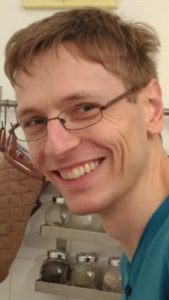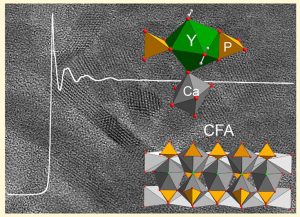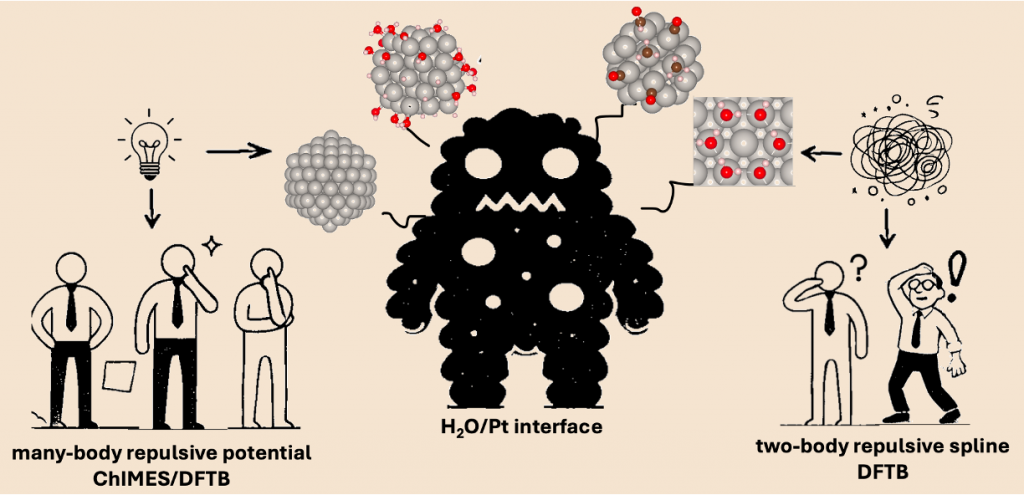 CNRS Researcher
CNRS Researcher
Laboratoire de Chimie
ENS de Lyon, France
Main interests:
Modelling Solid/Liquid Interfaces
Developping Tools for Cluster Expansions
Improving the Description of Charged Surfaces
 CNRS Researcher
CNRS Researcher
Laboratoire de Chimie
ENS de Lyon, France
Modelling Solid/Liquid Interfaces
Developping Tools for Cluster Expansions
Improving the Description of Charged Surfaces
As part of the ERC project DEEP-SEE (collaboration with Alain Manceau), the next chapter of the incorporation of rare earth elements in apatites from the sea floor is now published in Environmental Science: Nano. It turns out that Gadolinium is not associated with cerium in a phosphate rich precipitate, but rather present in the amorphous layer surrounding apatite, similar to yttrium. Indeed, computations evidence that a medium-range distance (about 6.2 Å; just out of reach for EXAFS detection) between Gd and/or Y atoms leads to the most stable aggregate.
It has been a great pleasure to be associated to this fundamental work by Loget and Pattanasattayavong, just published in J. Am. Chem. Soc. The iron content in NiOOH changes it’s redox potential less than the workfunction. This is due to a combined effect: Fe-surface content is higher than in the bulk and it changes the hydrogenation surface state, leading to more oxidized surfaces compared to the pure Ni surface.
Ten years after my first publication on pyridine adsorption on Au(111), we have revisited the system with advanced solvent models, electrostatic embedding and our GAL17 and GAL21 force fields. Mingjun has worked hard to make this article happen – and it paid out: I am very happy that the work has now been published in Electrochimica Acta.
SchemeHaving figured out where is Cerium, we wanted to know if Yttrium, which is much more abundant in fluoroapatite, is co-located with it or not. In our latest research on lanthanides in fluoroapatite, published in Chemistry of Materials, we demonstrate that Y is not in the same chemical environment as Ce. There are no Y aggregates detectable by EXAFS. Instead, Y seems to be incorporated in the amorphous coating of the apatite crystals.

Mohammed Bin Jassar has done a great job in writing a perspective on the use of kinetic Monte Carlo in the context of batteries. I am very happy to announce that it has finally been published in EES Batteries. We extensively discuss the challenges to achieve more reliable insights while keeping an atomistic or at least molecular resolution.
Discover the location and chemical nature of cerium in Rare Earth element rich bio-apatites in marine sediments in our publication in Communications Earth & Environment. In this article in strong collaboration with Alain Manceau (ERC DEEP-SEE), we finally publish the story of cerium in (or we should rather say on) biogenic apatite. Indeed, detailed experiments conclusively demonstrate that cerium is not inside the apatite structure, but forms phosphate precipitates on the nano-apatite crystals.
In the context of the productive collaboration with Alain Manceau and financed by his ERC DEEP-SEE, our comprehensive work on trends of the incorporation of rare earth elements across the entire series of lanthanides is now available in ACS Earth Space Chem. Our investigation shows that the smaller Ca2 site is generally preferred, not because of its size, nor because of the different charge-balance interactions, but mostly because of its larger flexibility.
After a very long time of hard choices, trials, fitting and fiddling, I am very happy to announce that our work on the parametrization of DFTB for the reactivity of organic molecules at the Pt/water interface is finally published in JCTC. Congratulations to Qing who did most of the work!

As a spin-off of the ANR Hykalin, we were invited to write this News and Views in Nature Energy piece on modified platinum catalysts for the alkaline hydrogen evolution reaction. Figure1
Sumit did a great job for the Figure and helping me with the text.
the accumulation of cerium in manganese oxides from the sea-floor as revealed by EXAFS and DFT.